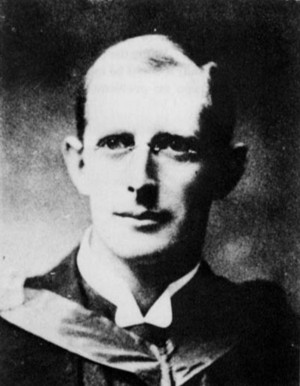Nathaniel H. Alcock facts for kids
Quick facts for kids
Nathaniel H. Alcock
|
|
|---|---|
 |
|
| Born |
Nathaniel Henry Alcock
12 February 1871 Letterkenny, County Donegal, Ireland
|
| Died | 13 June 1913 (aged 42) Montreal, Canada
|
Nathaniel H. Alcock (born February 12, 1871 – died June 13, 1913) was an important Irish medical doctor and scientist. He taught about the human body and even invented a special machine to help with surgery.
Contents
Early Life and Education
Nathaniel Henry Alcock was born in a town called Letterkenny, in Ireland, on February 12, 1871. His father, Daniel Robert Alcock, was a doctor who worked for the Royal Navy.
Nathaniel went to Trinity College Dublin, a famous university. He studied natural sciences and graduated in 1893. A few years later, in 1896, he also earned degrees to become a medical doctor.
Family and Moving to Canada
In 1905, Nathaniel Alcock married Nora Lilian Scott. They had four children together: one son and three daughters.
In 1911, Nathaniel and his family moved to Canada. Sadly, he passed away on June 13, 1913, from a serious illness called leukaemia. His son, Nathaniel Scott, later followed in his father's footsteps and became a brain doctor (neurologist).
His Work as a Doctor and Teacher
After finishing his studies, Alcock started teaching. He taught about the human body's structure (anatomy) at Victoria College in Manchester. He also taught about how the body works (physiology) at Trinity College Dublin.
In 1902, he became a research fellow at the University of Marburg in Germany. The next year, in 1903, he joined the new physiology department at the University of London.
In January 1904, Alcock became a lecturer on physiology at St Mary's Hospital Medical School. He later became the vice-dean there in 1906.
Inventions and Research
Nathaniel Alcock was also an inventor. In 1908, he designed a special device to control how much chloroform vapour was given to patients during surgery. Chloroform was a type of anaesthetic, which means it helped patients not feel pain during operations. His invention made anaesthesia safer.
In 1909, he earned a special degree called a DSc for his important research in physiology. He also wrote a book with F. O'B. Ellison called A textbook of experimental physiology in 1909.
In 1911, Alcock was chosen to lead the physiology department at McGill University in Canada. He held this important position until he passed away in 1913.
Besides his medical work, Alcock also studied nature. In 1903, he published a paper about Irish bats with another scientist, Charles Bethune Moffat.

